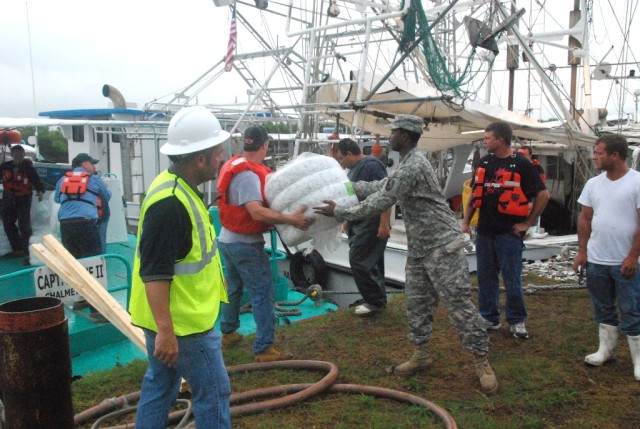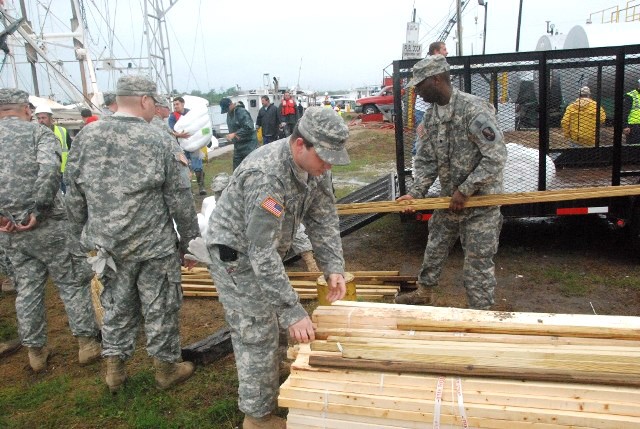WASHINGTON (May 4, 2010) -- Defense Secretary Robert M. Gates has given verbal approval to the governors of Alabama, Mississippi and Florida for Title 32 status for National Guardsmen to help to combat the oil spill in the Gulf of Mexico.
The requests are in addition to Louisiana Gov. Bobby Jindal's request for up to 6,000 National Guardsmen to be covered under Title 32 authority that the secretary approved yesterday, Pentagon spokesman Marine Corps Col. David Lapan said.
Alabama requested up to 3,000 Guardsmen, Mississippi requested 6,000, and Florida requested up to 2,500. Louisiana has employed about 1,200 Guardsmen on Title 32 status, and they are providing command-and-control and sandbagging assistance in St. Bernard and Plaquemine parishes. Guardsmen possibly could be used in communications, logistics, transportation, assessment, medical, aviation support and shoreline clean-up, Lapan said.
Once the secretary gives approval for the Guard units to operate under Title 32 authority, "what puts them into action are requests from the on-scene federal coordinator," Lapan said.
Most of the 1,200 Louisiana Guardsmen are from the 225th Engineer Brigade with headquarters in Pineville, La. However, many of the volunteers are from the brigade's battalions located throughout the state, said Army Col. Mike Deville, state public affairs officer.
All Guardsmen are receiving Occupational Safety and Health Administration training as they come on duty to deal with contaminants when and if they come ashore.
The Guardsmen have pre-positioned a package of engineering and logistics equipment to be able to respond as quickly as needed, and they've helped the Coast Guard load booms on boats for deployment. They also are running aviation missions not only to provide reconnaissance of the oil slick, but also to ensure that boom equipment hasn't shifted position, officials said.
The oil slick has not reached shore yet, said Air Force Gen. Craig R. McKinley, chief of the National Guard Bureau here.
"We have a good construct to operate in," McKinley said during a Defense Writers Group breakfast today. The Coast Guard is the lead federal agency in the crisis, and National Guard leaders in the region have a good working relationship with the service, McKinley said.
Title 32 authority means the Guardsmen continue to work for the governors of the states, McKinley said. "It also gives the federal government the opportunity to recover the funds through the Oil-Spill Recovery Act," he said.
The general said Jindal has indicated he will pre-position forces so he can react if the spill comes ashore. The pre-positioning will allow authorities to "get the needed people and equipment from the civilian agencies to the scene quickly and rapidly so we can assist BP and the other oil companies - who are taking a very proactive response," McKinley said.
"We'll be part of that community-based force that knows the roads, knows the back roads, knows the estuaries and knows the parish leadership," he added, "and get the real experts to the scene, secure the site, set up relief efforts to feed people [and] to do the kinds of things a large relief operation will require."
The Louisiana National Guard still has the high-water vehicles that were used in Hurricane Katrina relief operations, and the state has learned a lot since that catastrophe in 2005, the general noted.
"There has been marked improvement since Katrina in how the state of Louisiana attacks a problem like this," McKinley said.




Social Sharing